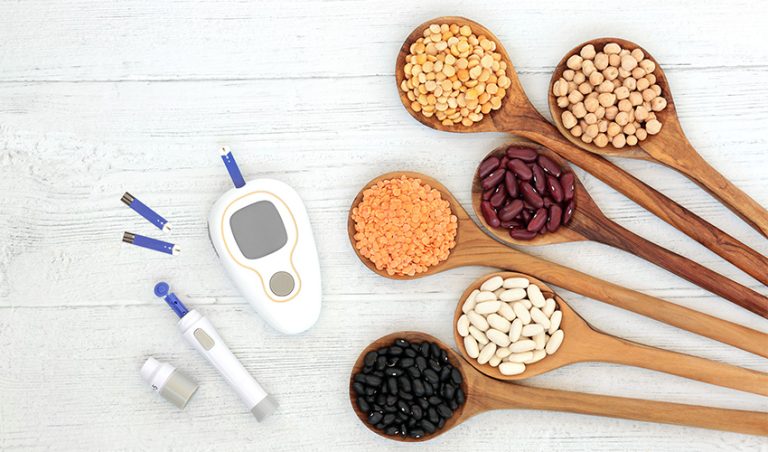
Several myths related to protein consumption and blood sugar exist. Some people with type 2 diabetes believe that protein intake can raise their blood glucose levels, while others say high protein intake will always lead to diabetes.
The prevalence of these myths has compelled people with diabetes to reduce their daily protein requirements. Many have even ditched the macronutrient completely. According to studies, high protein intake can reduce the risk of developing diabetes, provided one loses weight. Further, protein has a minimal effect on one’s blood sugar levels with adequate insulin.
So, this National Protein Day (February 27), let’s ignore all these misconceptions and promise to include sufficient protein in our diet.
Protein is a crucial macronutrient for controlling blood sugar levels. It helps prevent post-meal sugar spikes in the blood while keeping one full for longer. This helps avoid overeating and eventually prevents excess fat accumulation, two key effects indispensable for optimal sugar levels.
A 2017 study found that an intake of whey protein can help help individuals in managing type 2 diabetes. According to this study, whey stimulates insulin secretion in people with healthy triglyceride levels and body weight. Another study found that a high intake of fatty fish like sardines and salmon improves post-meal blood sugar levels.
During digestion, proteins break down into amino acids through a process called hydrolysis. Once the amino acids are absorbed, they are released into the bloodstream, from where they are taken to organs and tissues. There, they are either used to build muscles and repair damaged tissues or are again assembled into proteins via condensation polymerisation.
Try the Nutrition Calculator to get detailed insight on your daily meal
The general RDA of protein for an average adult (man or woman) is 0.8g of protein per kg of body weight per day. However, this is a minimum level as the exact requirement for an individual depends on certain factors, such as:
Well, the chart below shows the RDA of proteins for a person according to age:
| Age and Sex | Total RDA in grams (g) per day |
Babies and Children | |
| 0 – 6 months | 9.1 |
| 6 – 12 months | 11 |
| 1 – 3 years | 13 |
| 4 – 8 years | 19 |
Males | |
| 9 – 13 years | 34 |
| 14 – 18 years | 52 |
| 19 – 70 years and older | 56 |
Females | |
| 9 – 13 years | 34 |
| 14 – 70 years and older | 46 |
Pregnant or Lactating people | |
| Any age | 71 |
(source:https://www.ncbi.nlm.nih.gov/books/NBK56068/table/summarytables.t4/)
For people with diabetes, the American Diabetes Association recommends spacing out their meals to let the body absorb only the required amount of protein. Also, it is also crucial to resort to varying sources of high-quality protein. For instance – people with diabetes can eat various protein foods like dairy, eggs, fish, meat, beans, lentils and nuts. They can complement their meals with a protein supplement like protein shakes.
During digestion, protein is broken down into simpler compounds or byproducts. The kidneys eliminate these byproducts in the form of waste that passes into the urine. When the kidneys are unhealthy, they cannot filter out the waste. This leads to the accumulation of byproducts of protein in the blood and eventually engenders a host of health concerns.
More than required protein intake can also cause kidney hyperfiltration, leading to an increased glomerular filtration rate than normal values. Implement portion control and rely on high-quality protein sources for optimal kidney function.
Drinking water dilutes the amount of sugar in the bloodstream and eventually helps to regulate blood sugar levels. Here are a few healthy drinks people with diabetes can count on:
Consult Now & get personalized guidance to improve your health and wellbeing
When it comes to a protein rich nutrition drink for people with diabetes, a protein shake is one of the most healthy options to consider. Unlike sugar-loaded packed protein drinks that increase sugar levels, protein shakes made with a high-quality protein powder reduce the chance of sugar spikes. These protein supplements also keep you full for longer.
If you opt for ready-to-drink protein shakes, make sure to check their labels to ensure there is no trace of added sugar. You can add nuts and seeds while preparing the shakes to make them extra flavorful and healthy.
The importance of protein and its role in optimal blood sugar levels have allowed people with diabetes to resort to healthy drinks containing high-quality protein. Since packaged protein drinks contain high sugar content, one can count on protein powders to prevent sugar levels from soaring high.
Prohance D, a specially formulated protein powder for diabetics, is highly beneficial in such a case. With 10.1 grams of high-quality protein and loads of healthy fats and dietary fibre, this sugar-free protein powder helps manage the symptoms of diabetes effectively. Use it as a breakfast replacement, before a meal, or as an evening snack to regulate diabetes and manage weight.
Disclaimer: This blog is meant for awareness/educational purposes and does not constitute or imply an endorsement, sponsorship, or recommendation of any Products. Please consult your doctor/healthcare practitioner before starting any diet, medication, or exercise.
